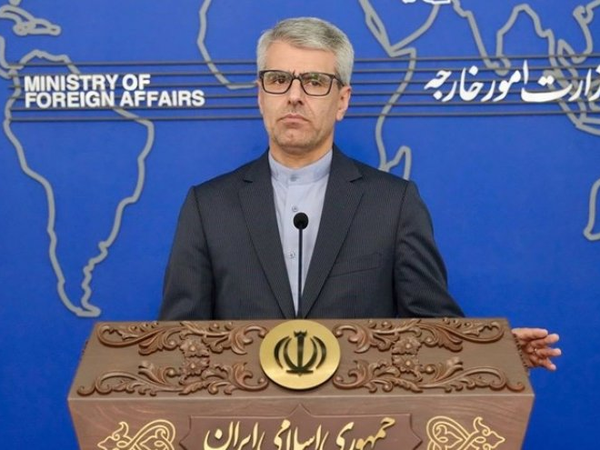Iran's foreign ministry warned on Monday of a decisive response to Israel’s October airstrikes on its territory, adding that any attack on its nuclear facilities would violate a UN ban.
The strikes on October 26, targeted Iranian military facilities, including air defenses, following missile attacks on Israel by Iran earlier that month.
"In defending our territorial integrity and sovereignty, we seek no one's permission, and any aggression will undoubtedly be met with a decisive response," Foreign Ministry Spokesman Esmail Baghaei said Monday during his weekly briefing.
He also reaffirmed Iran’s support for regional militia groups, underscoring Tehran’s broader strategy in the region amidst ongoing hostilities.
Baghaei also said that the country's nuclear facilities must be protected from any potential attacks by Israel, in compliance with a resolution adopted more than three decades ago by the UN nuclear watchdog, the IAEA.
There is no UN Security Council resolution that bans attacks on nuclear facilities, but the International Atomic Energy Agency (IAEA) did adopt General Conference Resolution (GC(XXXIV)/RES/533) in 1990 that prohibits armed attacks on nuclear facilities, "devoted to peaceful purposes." The resolution also calls for strengthening international cooperation on nuclear safety and radiological protection.
"This resolution is a clear rule that prohibits any threats against nuclear facilities," Baghaei said, but did not mention the wording which says "devoted to peaceful purposes. "Such threats endanger the national security of states, and the United Nations must provide a decisive response to them."
Israel's new defense minister said last week that the Islamic Republic's nuclear facilities are now more exposed than ever, following Israel's October 26 airstrikes that targeted critical Iranian air defense systems.
In his remarks, Israel Katz said the vulnerability of Iranian nuclear sites has made it more plausible for Israel “to achieve the most important goal, to thwart and remove the threat of annihilation from hanging over the State of Israel."
“Our region has been familiar with the law-breaking approaches of the Zionist regime for decades. We will take all necessary actions to protect our nuclear facilities,” said Baghaei on Monday.
It is not clear what nuclear facilities Israel would target, but Iran's underground uranium enrichment sites, producing highly purified fissile material, might not be considered as peaceful.
Iranian authorities have consistently called for Israel's destruction, and until now, refused to call it anything other than “the Zionist entity.”
Responding to inquiries about European nations' willingness to negotiate, Baghaei said Iran is open to discussions. "We have never abandoned negotiations on the nuclear issue," he said. "The revival of the JCPOA has been an ongoing process, and Iran has consistently demonstrated its goodwill in these efforts."
Iran's nuclear talks during the Biden administration, centered around reviving the 2015 Joint Comprehensive Plan of Action (JCPOA), remain a focal point of international diplomacy. The agreement aimed to limit Iran's nuclear activities in exchange for sanctions relief, but its future is now uncertain since the US withdrew in 2018 and reimposed sanctions, prompting Iran to gradually breach its commitments. Recent negotiations have faced significant hurdles, including disagreements over sanctions relief, verification mechanisms, and guarantees against future US withdrawal. While Iran insists its nuclear program is peaceful, Western powers express concern over its enrichment of uranium to near weapons-grade levels.
Baghaei pointed to a recent visit by the International Atomic Energy Agency (IAEA) Director-General Rafael Grossi as evidence of what he called Iran’s constructive approach.
"The visit was productive and positive, leading to constructive agreements. We expect the opposing parties to recognize Iran's positive approach and let the process proceed on a technical path, free from political pressure," he added.
He went on to say that ambiguities in Iran’s nuclear program raised by the IAEA lack a clear basis and were thoroughly discussed during Grossi's visit.
"Iran remains committed to ensuring that the Agency can operate without the disruptive and malicious pressures exerted by certain parties," Baghaei said, stressing the importance of allowing the IAEA to work independently of external political influences.
Iran's relationship with the IAEA has been fraught with tension in recent years, particularly over issues of transparency and compliance with nuclear agreements. The IAEA has repeatedly raised concerns about Iran's enrichment of uranium to near weapons-grade levels and its lack of cooperation in granting access to key sites. Tehran, in turn, accuses the IAEA of being influenced by political pressures from Western powers and insists that its nuclear activities are peaceful and within its sovereign rights.
